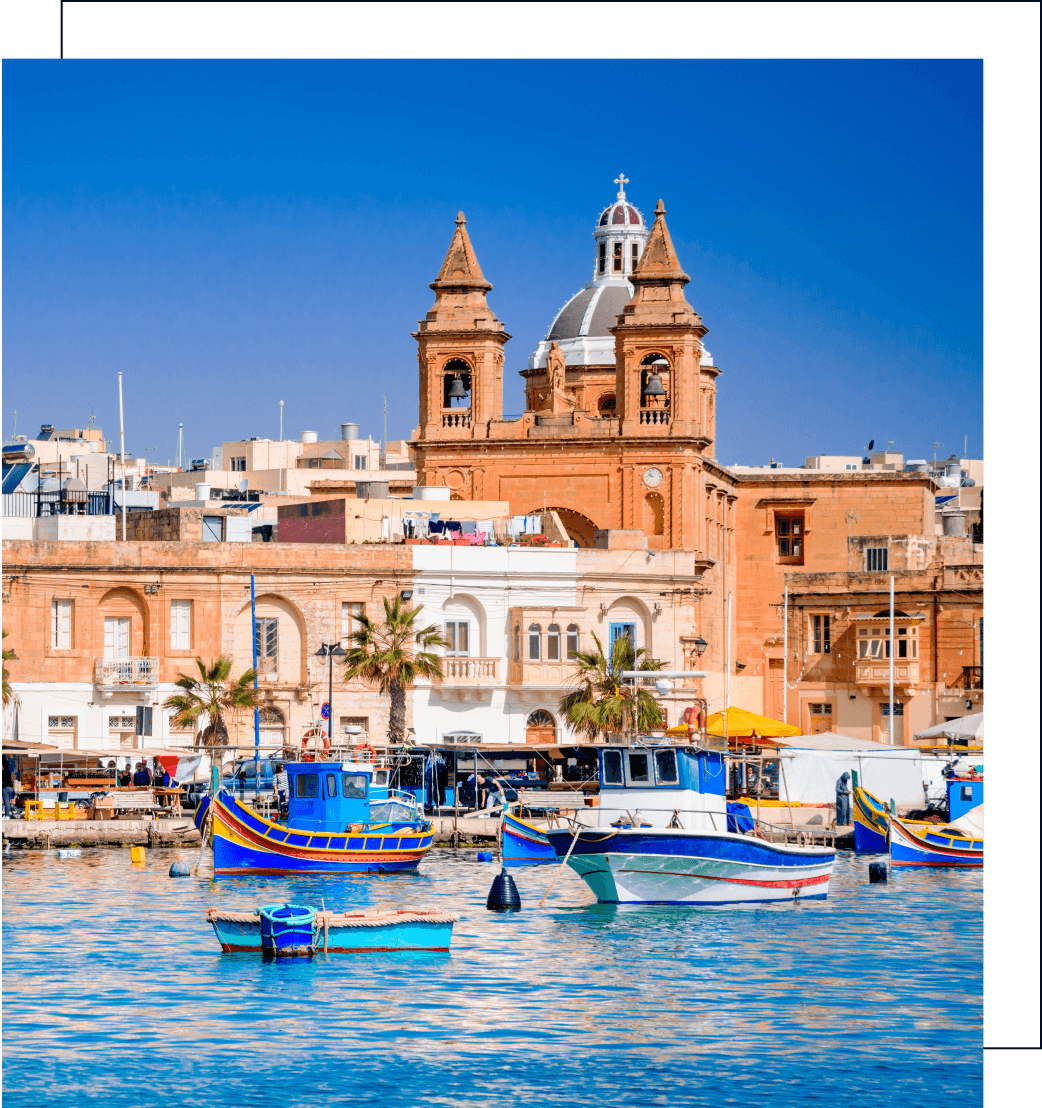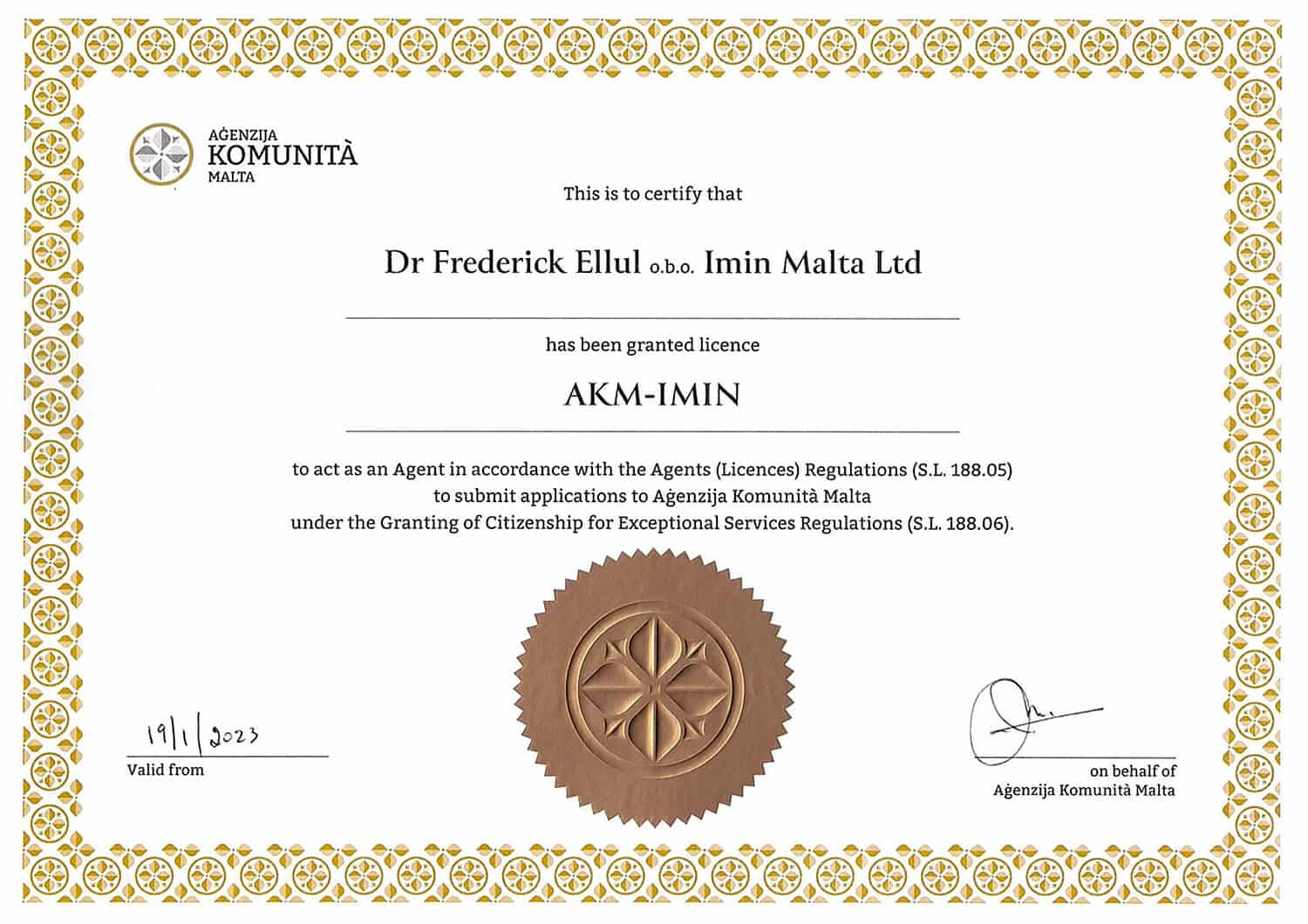Malta citizenship
and residency
for investors
Maltese residents and citizens can visit the Schengen countries visa-free and live in a developed European country.
Learn more
The Maltese law offers investors specific pathways to obtain residency by investment or citizenship by naturalisation for exceptional services. Investors are required to undergo Due Diligence, make non-refundable contributions, and purchase or lease properties in Malta. Each status — citizenship, permanent residence, or a residence permit — has its own procedures, financial requirements, and timelines.
Residents of Malta have the right to live and study within the country and can travel to other Schengen states for up to 90 days within any six-month period.
As an EU member state, Malta grants its citizens the freedom to live, work, and study in any other EU country.
Difference between Malta citizenship, permanent residence and a residence permit
The statuses provide different rights. First and foremost, the number of visa-free destinations varies.
Malta citizenship offers the maximum number of opportunities. A Maltese passport holder can freely visit all states with visa-waiver agreements with Malta. The list includes 169 countries.
Maltese residents can only freely travel to Schengen countries. Thus, there are 27 visa-free states.
Permanent residence is granted for life. A residence permit must be renewed every year.
All three statuses allow the holders to visit Malta anytime, even if the country’s borders are closed.
Need help in choosing a status?
Our experts in investment migration will analyse your tasks. Our Compliance Department will carry out preliminary Due Diligence. This approach will help you get the most suitable status.
 Vladlena Baranova
Lawyer, AML Compliance officer, certified CAMS specialist
Vladlena Baranova
Lawyer, AML Compliance officer, certified CAMS specialist

Benefits of Malta citizenship and residency
Visa-free travel
Maltese citizens visit 169 countries visa-free, including the UK, the USA, Canada, Australia, and Japan. Residents can travel across the Schengen Area without visas.
Safe haven
Investors and their families can enter Malta anytime with residence permits or passports. They can live in Malta for an unlimited amount of time. In comparison, a Schengen visa allows the holder to spend only 90 days in half a year in Malta.
Access to services
of European banks
Malta residency or citizenship provides access to the services of European or US banks. Investors open bank accounts abroad to keep savings in a hard currency, fasten payments with business partners worldwide, and decrease transaction costs.
Living in a developed EU country
Many investors obtain Malta citizenship or residency to relocate to a country with high living standards. The passport allows the holder to live and do business in any EU state. The investor's spouse and children can also study and work in any EU country without needing special visas or permits for their chosen country of residence.
A residence permit allows the holder to live, do business and study in Malta. An investor with a residence permit or permanent residence cannot work in the country.
Quality education
The investor’s children don’t need special permits to study in any EU country if they have Maltese passports. They can get student visas on a fast-track basis to study in the UK.
Business development
in Europe
An investor can register companies in Malta and other EU states. Many investors transfer their businesses to Malta using opportunities for beneficial taxation.
Registration of a business in the EU helps quickly forge partnerships in developed countries. Geopolitics has little effect on the business.
Income from investments
in European real estate
Villas and apartments located in developed European countries bring up to 15% of rental income per year. However, many EU states, such as Austria, restrict property purchases to EU residents or citizens. Malta citizenship or residency gives access to investing in liquid European real estate.
Why you can rely on Immigrant Invest
Immigrant Invest has operated since 2006. During this time, we helped 1,000 investors and their family members get residence permits, permanent residence or citizenship in Malta.
Investors apply for Malta residency or citizenship only through a licenced agent; one cannot apply by themselves. Immigrant Invest has passed government Due Diligence and got a licence to prove it. Thus, we can act on the investor’s behalf during application procedures in Malta.
Our offices work in 6 countries. The lawyers assist investors at each step. Thanks to an individual approach to each investor’s task, we have the highest success rate in the industry: 99% of our clients’ applications get approved.

Financial requirements and time frame for obtaining Malta citizenship or residency
The investor gets a residence permit or permanent residence under special government programmes. It is less expensive to obtain a temporary residence permit than a permanent one. However, a residence permit must be renewed yearly, while permanent residence is granted for life.
Obtaining citizenship by naturalisation for exceptional services by direct investment requires the highest expenses and the longest waiting time. The passport is granted if the investor meets the conditions under the Maltese Citizenship Act.
| Status | Citizenship | Permanent residence | Residence permit | Digital Nomad Visa |
|---|---|---|---|---|
| Legal basis for granting a status |
Maltese Citizenship Act
Legal basis for granting a status
|
Malta Permanent Residence Programme
Legal basis for granting a status
|
Malta Global Residence Programme
Legal basis for granting a status
|
Immigration Act, Chapter 217 of the Laws of Malta
Legal basis for granting a status
|
| Investment amount |
€690,000+
Investment amount
|
€150,000+
Investment amount
|
€30,000+
Investment amount
|
None, but income of €42,000+ per year is required
Investment amount
|
| Time frame |
1 or 3 years
Time frame
|
6–8 months
Time frame
|
3–4 months
Time frame
|
5+ months
Time frame
|
Malta citizenship
Since 2020, investors have had the opportunity to become Maltese citizens by naturalisation for exceptional services by direct investment. This path is suitable for investors willing to undergo the most stringent Due Diligence in the CBI market and contribute at least €690,000 to the country's economy.
The process begins with the investor obtaining a residence permit. After maintaining residency for either one or three years, they become eligible to apply for citizenship. The required investment amount increases by €150,000 if applying within one year compared to applying after three years of obtaining a residence permit.
In addition to the investor, their spouse, children under 29, and parents and grandparents over 55 can also obtain citizenship.
Difference in investment amounts when applying after 1 or 3 years of residency
| In a year | In 3 years |
€760,000 as a €16,000+ per year as a or €700,000+ as a |
€610,000 as a €16,000+ per year as a or €700,000+ as a |
Malta permanent residence
The Malta Permanent Residence Programme has been operational since 2015. This program is suitable for investors seeking lifelong residency in Malta or wishing to relocate to the country. There is no requirement for permanent residency holders to live in Malta continuously.
To qualify, the investor must undergo Due Diligence, make a non-refundable contribution, purchase or lease property, and confirm assets worth more than €500,000 for the first five years.
In addition to the investor, their spouse, children under 18, and parents and grandparents can also obtain Maltese permanent residency.
Difference in investment amounts when renting or buying a property:
| Rent | Purchase |
€98,000 as a €10,000+ as an |
€68,000 as a €300,000+ as a |
Malta residence permit
The Malta Global Residence Programme was launched in 2013. The programme is suitable for investors who want to become Maltese tax residents. The change of tax residency is mandatory. In addition, the investor mustn’t spend more than 183 days a year in another country. However, there is no requirement to live in Malta all the time. The investor pays an annual tax of at least €15,000.
The investor passes Due Diligence, makes a non-refundable contribution, and buys or rents a property.
A spouse, children under 25, siblings, parents and grandparents can become Maltese residents with the investor.
Difference in investment amounts when renting or buying a property:
| Rent | Purchase |
€6,000 as a €8,750+ as an |
€5,500+ as a €220,000+ as a |
Malta Digital Nomad Visa
The Malta Nomad Residence Permit was introduced in 2021. The programme is suitable for freelancers, self-employed, and remote workers with an annual income of at least €42,000 outside Malta. Applicants cannot work for Maltese companies.
The Malta Digital Nomad Visa is valid for 12 months. The status can be renewed 3 times for the same period. Digital nomads must buy or rent housing for the entire permit validity period. There is no requirement on the property minimum cost.
A spouse, children under 18, and financially dependent children over 18 can get Malta Nomad Residence with the main applicant.
Requirements:
| €42,000+ in annual income |
| Rented or owned housing |
Which status suits your tasks best?
Malta is one of the few European countries that offer investors the opportunity to obtain either a temporary or permanent residence permit, or to apply for citizenship. In contrast, most developed European countries limit their offerings to Golden Visa programs.
Frequently asked questions
Two government-approved Maltese programmes offer a residence permit or permanent residence by investment. The programmes differ in time frames, investment amounts, and additional requirements. For example, the Malta Permanent Residence Programme requires proof that the investor has assets worth at least €500,000.
The Maltese Citizenship Act outlines the path to naturalisation for exceptional services by direct investments.
A residence permit allows the investor to live in Malta with the family and run a business in the country. They can travel to the Schengen countries without visas, presenting residence ID cards. Maltese residents can stay in other Schengen states for up to 90 days out of 180.
The investor becomes a Maltese tax resident and pays an annual tax at a flat rate of 15% but not less than €15,000.
The residence permit obtained under the Malta Global Residence Programme must be renewed every year. The investor proves they have paid the tax and got a residential address in Malta.
Another investor’s duty is not to spend more than 183 days a year outside Malta.
Permanent residents have the right to live in Malta and visit other Schengen countries without visas. There are no requirements to spend all year in Malta, have proficiency in Maltese or English, or prove the knowledge of country’s history.
However, the investor must prove that they possess assets worth at least €500,000, including €150,000 as financial assets like deposits or securities.
Permanent residence is valid for life, but the ID card of a permanent resident must be renewed once every five years.
The Maltese passport allows citizens to move around the EU countries without limits. For example, to live in any state of the region without obtaining additional permits. If the investor’s children get Malta citizenship, they can study at any EU university without getting student residence permits.
Malta has visa-waiver agreements with 169 countries, including the USA, the UK, and Australia. Thus, Maltese citizens can travel the world freely and enjoy a cosmopolitan lifestyle.
Malta or any other EU country doesn’t have a citizenship by investment programme.
The Maltese Citizenship Act allows investors to apply for citizenship a year or three years after obtaining a residence permit. The application might be approved if the investor has passed strict Due Diligence and is willing to invest at least €690,000 in the country’s economy.
A residence permit, permanent residence and citizenship allow the investor to move to Malta with the family.
Unlike residency, citizenship provides more options on where the holder can live. Malta is an EU member state, and citizens of an EU country can live, work, run a business, and study in any country in the region. EU citizens don’t need separate permits for relocation. For example, a Maltese citizen can freely live in Austria.
Expenses depend on the status the investor wants to obtain. A residence permit requires the least investments. Costs start at €30,000.
The investor must spend at least €150,000 to get permanent residence. The investor should be ready to contribute at least €690,000 to the country’s economy when applying for citizenship.
The time frame differs too. A residence permit is the fastest to get. The earliest time the investor can apply for citizenship is a year after starting the procedure.
No, you cannot work for a Maltese company. Foreigners can apply for a Malta Nomad Residence only if they are freelancers, self-employed, or remote workers of foreign companies.
Digital nomads were previously not required to pay taxes on foreign income in Malta. From December 2023, they are subject to income tax at a rate of 10%. However, digital nomads are exempt from income tax for the first 12 months after obtaining a Malta Digital Nomad Visa.
To obtain Malta Nomad Residence, applicants need to confirm an annual income of €42,000 or more from sources outside of Malta.
Let’s discuss the details
Schedule a meeting at one of the offices or online. A lawyer will analyze the situation, calculate the cost and help you find a solution based on your goals.
 Zlata Erlach
Caribbean Investment Program Expert
Zlata Erlach
Caribbean Investment Program Expert
